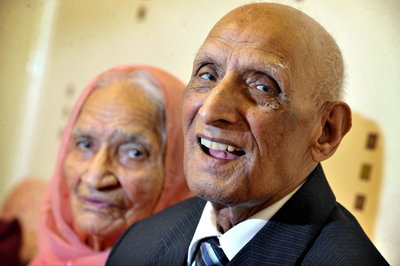London, Oct 3: An Indian-origin man in the UK, believed to hold the record for the world's longest marriage, has died.
Karam Chand, 110, died of natural causes in hospital last week – just six weeks short of celebrating his 111th birthday.
 Chand and his wife Kartari, 103, became celebrities last year following their 90th wedding anniversary. The couple never argued, according to their family.
Chand and his wife Kartari, 103, became celebrities last year following their 90th wedding anniversary. The couple never argued, according to their family.
They lived at home in Girlington, near Bradford, West Yorkshire, along with their son Paul – who was devastated at the death of his father, the metro.co.uk reported.
"We're absolutely devastated at his passing – not many people live to that age," Paul said.
Karam was born in 1905 into a farming family in Punjab during the British Raj, at a time when it took six weeks to reach India via the Suez Canal.
He had an arranged marriage to Kartari and they tied the knot in a Sikh ceremony in 1925. The couple came to Bradford in 1965 when Chand replaced his hard work as a farmer – with the city's woollen mills.
Their now four generation-strong family is huge stretching down from Karam and includes eight children, 27 grandchildren and dozens of great-grandchildren.
"Eat and drink what you want but in moderation. I have never held back from enjoying my life," Previously speaking about his life, Chand had said.
Chand had said he had given up his one cigarette a day – but still enjoyed an occasional tot of whisky.
"We have always eaten good wholesome food, there's nothing artificial in our diet but things like butter, milk and fresh yoghurt are what we like," he had said.
"We know that being married for 86 years is a blessing – but equally we will be ready to go when it's time. It's all up to the will of God, but we really have lived a good life," Chand had said.
Chand's death, last week means his marriage lasted 90 years and 291 days in total.
Although this was believed to be the world record it had never officially been recognised by Guinness World Records.
The oldest Guinness-recorded marriage is the 86-year union of American couple Herbert and Zelmyra Fisher, both of whom have since died.
The oldest man in the UK is an anonymous resident of Claygate, Surrey, who is 111, according to the website Oldest in Britain. The oldest British woman is Bessie Camm, of Rotherham, South Yorkshire, who is 112.





Comments
Add new comment